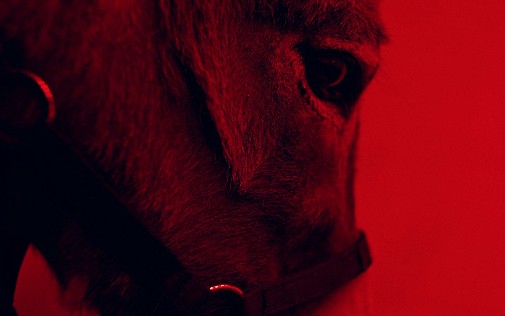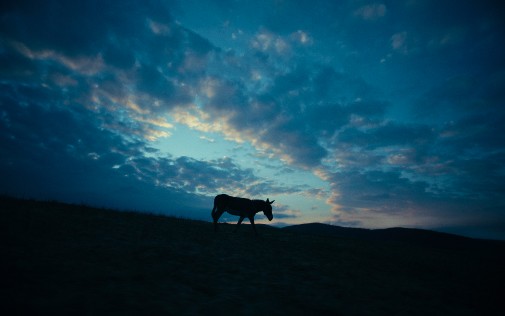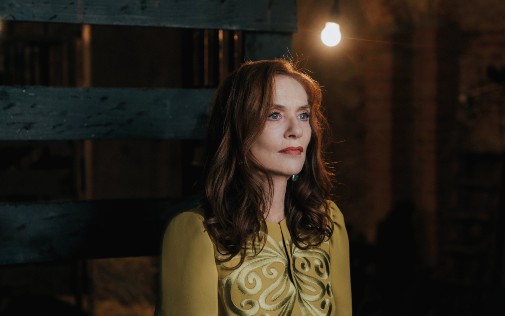Review: Skolimowski's "EO" is a miracle!
 Saturday, November 19, 2022 at 12:30PM
Saturday, November 19, 2022 at 12:30PM 
Can donkeys dream of heaven? One hopes so, for they need not search for hell in sleepy fantasy – they live it every day, wide awake. A world defined by human cruelty demands dreams of something better, something beyond the pain. Is it peace, love, a state of joy? Maybe it's red.
EO all starts in red. Bathed in scarlet light, skin touches fur, human hands over the animal's body, a trance-like choreography that's both intimate and public. There's a closeness to these touches that transcends their physical softness, a beauty that's more than mere performance for circus audiences – it's that heaven we spoke about, but maybe it's hell, too. Red will linger, a memory, perhaps a reverie. Dreams are nightmares by another name, and so is EO, both nightmare and dream right from the beginning…

From then on, EO unravels similarly to its Bressonian inspiration of Au Hasard Balthazar, detailing the stations of the cross remixed and reshuffled, remade in the image of an ass. Through its picaresque travels, the circus donkey taken from his trainer by activist action goes from owner to owner, from one tragic fate to another that's even worse. Christ-like suffering is a constant, suggested even when pain is far away since the donkey's fur bears cruciform markings, dark patches forming the shape of a cross. And yet, to consider the creature purely allegorical would be a mistake director Jerzy Skolimowski pointedly avoids. His EO can have some son of God characteristics without sacrificing its base nature to symbolism.
In other words, he's never more of a metaphor than he is a living, breathing, animal. That harsh reality stops the film's most florid readings from going too far off into the land of cinema-watching as puzzle-solving. The visceral experience of the animal is never lost, his physical presence never too abstract, even while the formalistic constructs that frame it go wild. Indeed, Skolimowski, who started out in the 1960s European vanguards, is more inventive than ever and a nasty little provocateur to boot. Instead of aligning the peaks of cinematic style to coincide with the human perspective or more overt religious interpretations, he does the opposite.
There are many scenes of EO alone or communing with other animals and the more we're in the depths of a world without people, the more outlandish the film gets. The push and pull becomes so perfectly absorbing that there comes the point where one dreads every human actor. No, EO run away from them - the screen needs more hallucinatory splendor, more forests tinged in crimson, streams that summon The Night of the Hunter, camera movements that should be impossible but somehow aren't. By the time Isabelle Huppert shows up, her character is more of a hindrance than anything else, a tonal shift that feels like it's asking to be excised. You want to shout at the screen for her to go away.
It should feel blasphemous to wish a film were without the great French actress, but blasphemy is the name of the game as much as spiritual transcendence is. But of course, that last bit can only be achieved if you count yourself as part of the church of cinema. Wine transmuted into blood shall not be consumed, nor shall we lose time with wafers turned metaphoric flesh. So out with the metaphors and in with the ecstasy of seeing a master filmmaker willing to experiment at the age of 84, proving wrong that adage that no director makes their best film late in life. One shall also give thanks to cinematographer Michal Dymek, composer Pawel Mykietyn, editor Agnieszka Glinska, and many other miracle-makers behind EO.

Reading what I've written so far, it's hard not to cringe at the sheer pretentiousness of it all. Still, along with ridiculous expression comes sincerity. I mean every word in this review, each coming from the bottom of my heart. Watching EO was an enchanting experience, the sort of thing where you feel the weight of a movie pressing down on you, pushing air out of your lungs by force of imagery and startling sound. Awe-inspiring doesn't begin to describe this perfectly imperfect film whose every unfortunate choice is counterbalanced by some of the most surreal shit you ever saw. It's not even proper surrealism in regards to what it depicts, but how it does so, always reaching for the cinematic sublime in shades of red.
EO is Poland's Oscar submission and is currently in theaters. Trust me, make that pilgrimage - it's worth it.



Reader Comments (3)
Incredible, moving, and stellar on a technical level, particularly the editing (the only way to create a moving performance from a donkey, cinematography and score. The last 15 minutes doesn’t quite hold up to the rest of the film for me, but it’s still one of the best of the year.
I’m glad you brought up that the sincerity overrides what on paper will strike many as pretentiousness, because unfortunately I don’t think a lot of people make that distinction. It’s too easy to dismiss a film — or a review of one — for being pretentious whenever it’s operating on a more “serious” level (in quotes only because “serious” has also developed sort of negative connotations in some circles), and I feel that attitude has been a hindrance to truly engaging film discussion. I realize that not only are a lot of the films I love considered pretentious by many but also that how I talk about them is regarded as pretentious as well, but you know what? Life is too short to let other people’s dismissiveness dissuade you from watching what you want and talking about it how you want to with people you want to talk about it with, so yeah, if something moves you in such a way that you feel the need to discuss it on “loftier” terms, don’t hold back just because there are some out there who will roll their eyes. If anything, I feel sorry for them if they’ve never connected with a film on a deeper level than “it was entertaining and the acting was good.”
That being said, I haven’t seen this film yet, but since Au hasard Balthazar is one of the most devastating films I’ve ever seen, exactly how closely would you say this follows it? I know it’s the main inspiration for it, but would you say it’s just used as a loose framework or does EO border on remake territory?
I agree totally with this review including the inexplicable appearance of Huppert. It completely breaks the spell while she's on screen. Luckily, it's a fairly brief role.
Otherwise, EO is one to experience